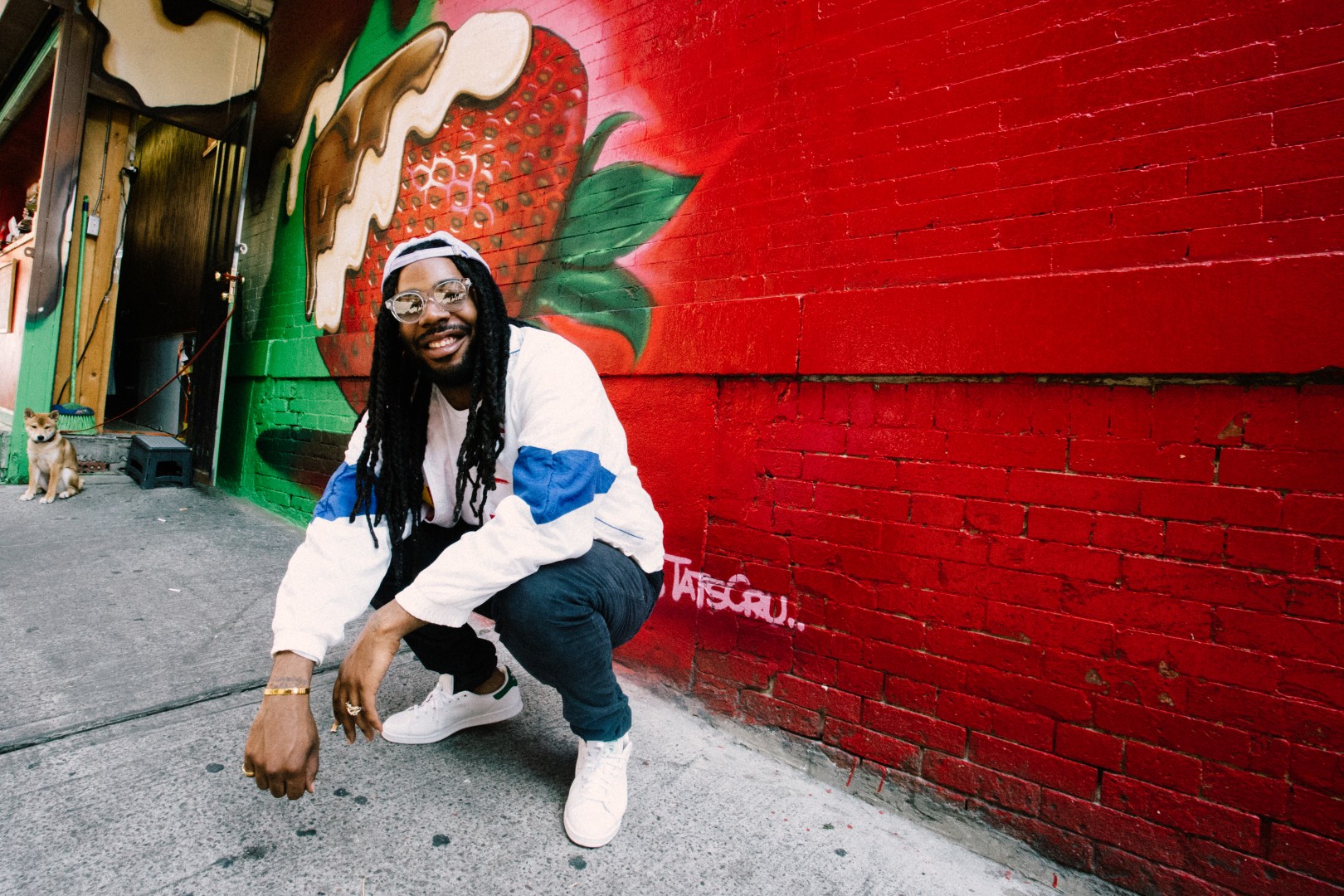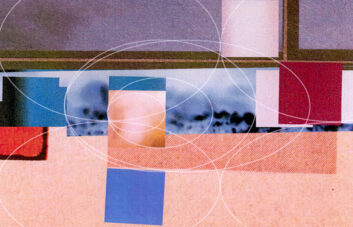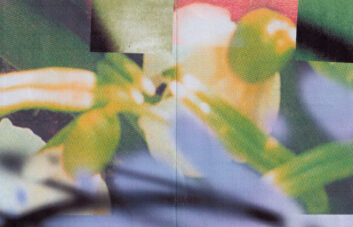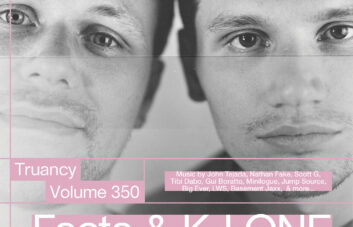Artists such as D.R.A.M., Lil Yachty, Lil Uzi Vert, iLoveMakonnen and Chance the Rapper hold a charismatic aura that’s present regardless of whether they use it for inspiration or introspection. That character is tied to an emotional vulnerability that they all willingly share with the world through their music – perhaps more visibly on their sleeves than other straight-presenting men of colour in the spotlight. They channel their vulnerability into a font to draw strength from. When I listen to them, I find myself longing to mimic them and create a source of energy to draw from myself. An environment of antiblackness and white supremacist patriarchy mask their admirable qualities, which many of us non-black people would be able to more easily perceive had we not sacrificed our humanity and their wellbeing. I look to them and consider that if they can get their shit together in front of the whole world, as they’re forced to, I should surely pay attention to the lessons they’re teaching and figure myself out too.
***
“What the fuck was I put here for? What the fuck is my purpose? Brain is lurkin’ / My momma mad I ain’t workin’, I feel worthless, but when I’m on stage and workin’ I am perfect / I mess up in perfect stride, it’s alright, just as long as you feel the vibe, feel the vibe.” Of all the calls to arms in D.R.A.M.’s “$”, these are the words that resonate most with me personally. The 21st century grind often comes hand-in-hand with existential doubts about modern living, even if deep down we know we’re asking ourselves the wrong questions. Longing to be able to really give back to generations that sacrificed so much to raise us, there can be apprehensions towards spending time doing things like writing about music. D.R.A.M. says that when we’re in the zone, acting out what we feel our calling is, we’ll be fine. Come what may, just roll with the punches. Hailing from Virginia, D.R.A.M. is most known for his Super Mario-inspired, “Hotline Bling”-inspiring “Cha Cha”. On “$”, his flow bounces between the punchy mantra of the hook to irresistible crooning verses, indelible and weightless. So much so that it can become freeing to listen to over its dramatic, thematic instrumental, now with added Donnie Trumpet fanfare. Focused around the struggle to thrive as an artist, D.R.A.M.’s self-inspiration instils valor in others by sheer proximity too. The softest yet most potent espresso shot, best served in the morning.
I wrote those words eleven months ago, and as far as sentiments go, my relationship with the song still holds true. In fact there are even more parts of the song that I latch onto now, as it remains on regular rotation on my streaming service of choice as well as my internal, imaginary mental jukebox. My relationship with the artist’s work has furthered, and D.R.A.M. himself has developed a huge amount. He appeared on the hugely anticipated Chance 3, Coloring Book, and he released a handful of singles including the summer ‘16 sleeper hit no one expected: the Lil Yachty-featuring “Broccoli”. Another of the year’s big surprises is of course the release of two full-lengths from Frank Ocean, who lists “$” as an all-time favourite song in Boys Don’t Cry. Certainly, D.R.A.M. has done a lot for the people.
“$” is totemic of D.R.A.M.’s ability to uplift those around him even just through proximity – his charisma is palpable. It feels the same way on other records too, namely “Broccoli”. Lil Yachty’s ascension has proved divisive for whatever reason, but everyone makes an exception as soon as that plucky piano ushers him in. It helps that D.R.A.M.’s already set the tone with the intro, and Yachty’s opener leaves an impression to say the least: “Hey lil mama, would you like to be my sunshine? / N**** touch my gang, we gon’ turn this shit to Columbine.” The extremities are effective, sure, but it’s the naivety of the first part that harmonises with D.R.A.M.’s earnest, happy-go-lucky delivery on the rest of the record. You can hear him smiling every time he sings the chorus. Yachty’s no stranger to childish hip-hop, yet simply being part of D.R.A.M.’s song makes the verse all the more memorable.
A plurality of voices is exponentially better than a lone one, thus it means so much more when artists reflect each other’s expressions and values across their bodies of work. On “$”, D.R.A.M. touches on returning the favours we owe to our parents, and he’d later release “Broccoli” wherein Yachty raps a diasporic son’s dream: “I just did a show and spent the cheque on my mama.” Meanwhile, Big Baby D.R.A.M.’s appearance on Coloring Book stems from a desire shared with Donnie Trumpet: making children’s music. And Chance the Rapper himself is well-known for including educational kids’ show Arthur in his ecstatic sermons, so they’re the perfect match for each other; Chance doesn’t even need to be on the track for it to work as an integral part of his album.
“D.R.A.M. Sings Special” features more cooing than crooning. Instead of solely speaking to Chance’s child, D.R.A.M. turns every single listener into a baby again with his voice. He peels away all of our layers until all that’s left is the initial core of our being, unsullied by this dunya, more open to anything than ever before. He sings to a “you” that we have to hold on to, that we rely on, that has our undivided attention. It’s the very same “you” he speaks to immediately after that which resonated with me on “$” eleven months ago: “It’s alright just as long as you feel the vibe, feel the vibe / I don’t know how you feel inside / But to me when you run and hide, that’s music suicide.” I think about that middle part a lot – “I don’t know how you feel inside.” It’s almost a throwaway sentiment, yet it acknowledges and affirms the listener’s existence, along with the rest of D.R.A.M.’s “yous”. It recognises all of the uncertainties and the unknowns, all of our struggles and anxieties, and it puts its arm around our shoulders and says it’s okay.
***
These artists also show plenty of emotional vulnerability through songs about love, whether they’re using love as a metaphor or speaking to romance itself. Lil Uzi Vert’s work is shaped around his girlfriend, Brittany Byrd, and iLoveMakonnen is prone to dropping multiple TV series’ worth of romantic drama in a single verse (plot twists and all). D.R.A.M. sees the positives in everything, from casual flings to potential marriages and beyond. This all flies against the nonchalance that toxic, patriarchal masculinity urges these artists to feel towards relationships: Don’t get tied down, don’t catch feelings. D.R.A.M. does the opposite on “Cha Cha”. He’s fully gassed after meeting the Taina-resembling Dominican woman in question, truly smitten: “I’ma tell all my boys ‘bout you mañana / Hope this is your number, I’m calling you mañana.”
SZA sings first on “Caretaker”, with D.R.A.M. following her lead. It’s reflected in the lyrics, as SZA is assured of her own feelings and actions whilst D.R.A.M. is forced to seek her blessing on his wishes. In the song’s narrative, their relationship has ended and she’s moved on more than he has, having found a new man. She hesitates to predict how much D.R.A.M. could actually do for her, whilst his voice becomes distant and isolated as he finally admits, “‘Cause I wasn’t there.” The song’s framing emphasises that D.R.A.M’s compassion has come too late and his failings have done too much damage already. As SZA challenges, “Tell me everything you think I wanna hear,” D.R.A.M.’s final, pleading line surrenders his pride in optimistic tenderness: “I swear, I’ll be there, just let me take care… of you.” The dynamics of emotional labour and gender in the song’s relationship are intentional, and D.R.A.M.’s vulnerability here lies in the honesty of his portrayal.
D.R.A.M. doesn’t use humour to deflect or distract himself from truths and realities. Rather, he augments and colours in his narratives with it. “Caretaker” has a precarious, delicate and soulful tone, yet D.R.A.M.’s outburst of “Even if you got a man now… Fuck that n****, I’ll never shake his hand now,” is completely in-character. It carries with it a shadow of the couple’s former life together, a flicker of a smile that validates their interaction.
“Cute” might well be D.R.A.M.’s best and most underrated single, dropping in the middle of the summer under a “Broccoli”-shaped shadow. It was made on the spot, in and of the moment, which is crucially what the song is all about; D.R.A.M. sees a woman, thinks she’s cute, and ultimately his imagination runs away with itself and he’s suddenly picturing their married life. That in itself is exactly the kind of sensation men are programmed to never allow ourselves to experience, as if it’s frivolous and feminine, thus ultimately forbidden. In reality, I experience it all the time and it’s so good to know D.R.A.M. does too. Heck, I catch myself acting against my feelings because I’ll see someone, plot our lives together and figure out whether there’s a feasible marriage there what with me being a Pakistani muslim man, before inevitably chucking the whole thing out the window ‘cause I remember I’m surrounded by heathens. Which is of course a completely ridiculous and inorganic way of existing here. D.R.A.M.’s the opposite, embracing the fairytale fantasy and coolly rolling with it, ‘cause she’s cute.
The first couple of verses actually see the artist taking things slow, hinting at movies, dinner and a little Maxwell during the bridge. It’s after that he turns into full on manic pixie dream D.R.A.M. for a third verse which arrives only two minutes into the whole thing, as if he’s been fighting to suppress his feelings up until then. His lyrics giddily tumble out as he comes up with all of the amazing things they’ll do together, though they’re grounded in mundanity as he grapples with the actual logistics of their future in this fantasy: “I got money, you got money too, so let’s go half on rent / When I buy you a new purse it’s because you bought my kicks.” After he all but proclaims their marriage, he drops an Abrahamic commandment to protect his feelings and firm their relationship as a sure thing. So, you know, that whole thought process after you see someone cute on Instagram.
As with most of D.R.A.M.’s music, there’s plenty of humour on “Cute”. It’s in that third verse, where his heart’s well and truly down the rabbit hole, that the song reaches its comedic climax. A decidedly absolute tirade escapes the infatuated D.R.A.M.: “If I say we married then Goddamn, we getting married / If you need it and I got it, you can have it – bitch, I’m sharing! / If you crying, I’ma ask you why you’re crying – bitch, I’m caring! / If you need me to look out for you, I’m posted and I’m staring.” The confessional rant is hilariously hamfisted in its exaggerated, earnest portrayal of the character’s perfect future. The song’s resolution then arrives as D.R.A.M. concludes that he’s into her so much that he’ll happily dial all of this back and wait for her signal.
None of the above songs actually mention ‘love’. D.R.A.M. reserves naming such a powerful force for an occasion that truly calls for it: his recent ode to the bankroll, “Cash Machine”. There’s a subtle, dextrous and somewhat meta humour to the fact that he’d save it for an irreverent chorus that’s as melodramatically enamoured as his more conventionally romantic material: “I love it when you talk to me, my cash machine, my cash machine.” As on “Cute”, he abandons his awareness in the moment: “Everybody’s talkin’ like a n**** actin’ funny now – that don’t matter, all I hear is [cash machine noises] since that cheque came in.”
Eleven months on, D.R.A.M.’s found the success he was looking for, and “Cash Machine” is a cognisant celebration of that. It’s telling that just as he struggled with on “$”, and just as Yachty boasted on “Broccoli”, the first verse on “Cash Machine” sees D.R.A.M. underline his intent: “Since that cheque came in, / Don’t you know I got that bag? / And you best believe my mama straight!”
***
Eleven months ago I was listening to D.R.A.M. motivate himself to face each day and find some sort of success. It seemed elusive after his big hit, “Cha Cha”, was outshined by a track it inspired – Drake’s “Hotline Bling”. In an interview, D.R.A.M. says he never believed he was out for the count, so long as he was able to continue to get through to the people. The stars must have truly aligned for “Broccoli” to take flight like it did, but regardless of scale, D.R.A.M. makes music that resonates with people more than they’d expect it to. It’s the same for his aforementioned peers, and “Broccoli” includes a knowing smile and nod to relationships worth cultivating with people through empathy, vulnerability and openness, as D.R.A.M. professes: “Turnt up in the party getting lit to Yachty!” Sure, it’s just a shout out to his feature artist, but being in the party, turnt up, getting lit to Yachty of all people – mumbling, mopey Lil Yachty! After all, how much can a party really mean if we’re not dancing under emotional duress, recognising our struggles and anxieties and putting our arms around each other’s shoulders to say it’s okay?




